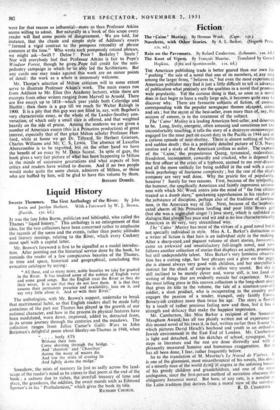Liquid History
Sweete Themmes. The First Anthology of the River.- By John Irwin and Jocelyn Herbert. With a Foreword by W. J. Brown. (Parrish. 17s. 6d.) fr was the late John Burns, politician and bibliophil, who called the Thames " liquid history." This anthology is an enlargement of that idea, for the two collectors have been concerned rather to emphasise the records of the scene and the events, rather than poetic attitudes Sand literary musings, relating to the River, which every Cockney must spell with a capital letter. Mr. Brown's foreword is first to be signalled as a model introduc- tion. After pointing out the historical service done by the book, he reminds the reader of a few conspicuous beauties of the Thames, in time and space, historical and geographical, concluding this evocative catalogue by saying: " All these, and so many more, noble beauties we take for granted in the River. It has inspired some of the noblest of English verse and some good songs. But the English treat the River as they do ' their wives. It is not that they do not love them. It is that they assume their permanent presence and availability, lean on it, and say very little about it. And so—with their River."- The anthologists, with Mr. Brown's support, undertake to break that matrimonial habit, so that English readers shall be made fully conscious of the part our Thames has played is the growth of our national character, and how in the process its physical features have been modulated, worn down, improved, added to, detracted from, in its serene journey through the centuries and the meadows. The collection ranges from Julius Caesar's Gallic Wars to John Betjeman's delightful poem about Henley-on-Thames in 1948, when " . . . beefy ATS
Without their hats
Come shooting through the bridge. And cheerioh ' and Oheeribye' Across the waste of waters die- And low the mists of evening lie And lightly skims the nudge."
Somehow, the mists of memory lie just as sadly across the land- scape of the reader's mind as be comes to that poem at the end of the book ; a sadness due to riches, the overfull treasury of time and place, the grandeurs, the oddities, the sweet moods such as Edmund Spenser's in his " Prothalamion," which gives the book its title. RICHARD CHURCH. RICHARD CHURCH.


































 Previous page
Previous page